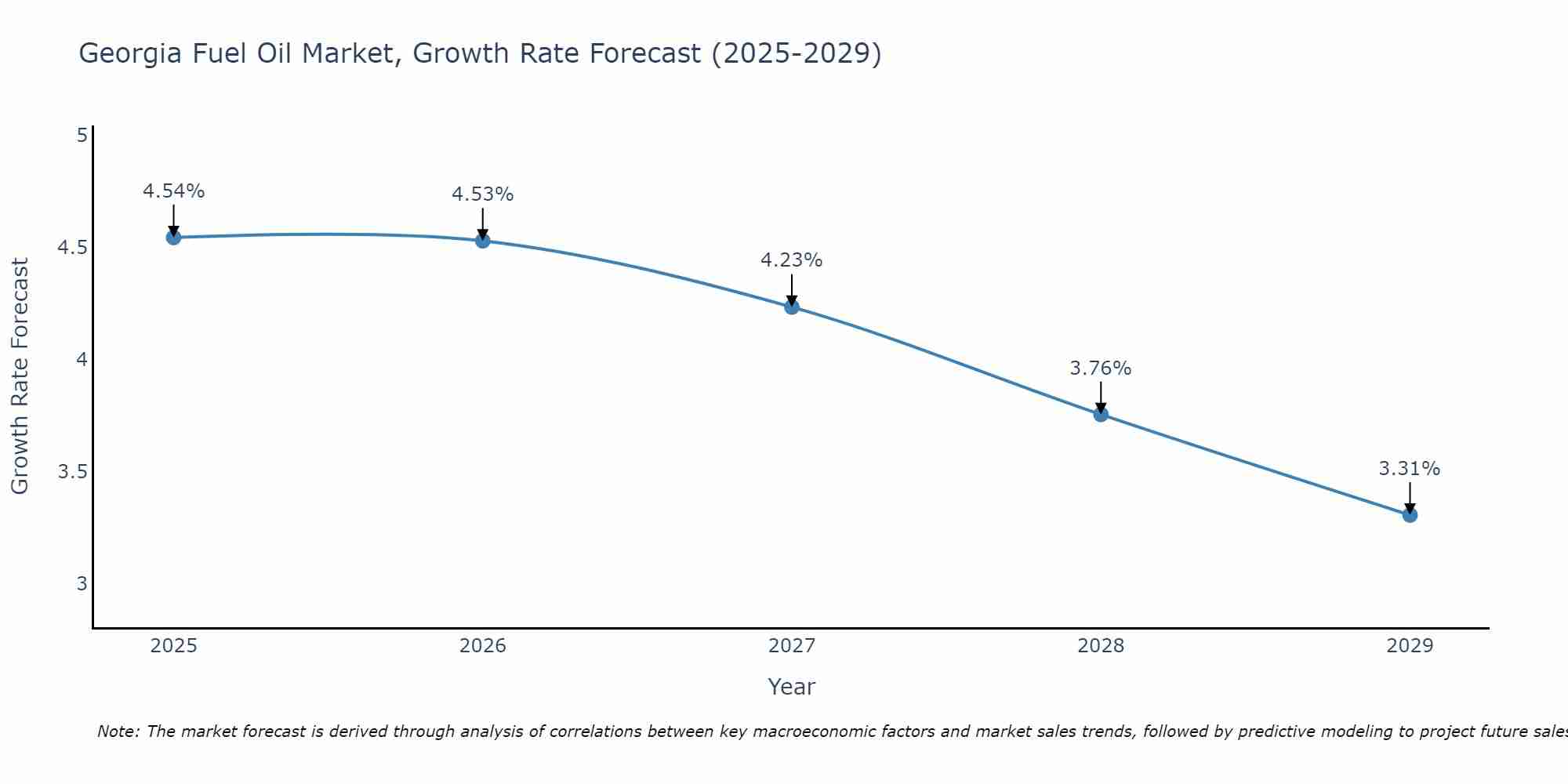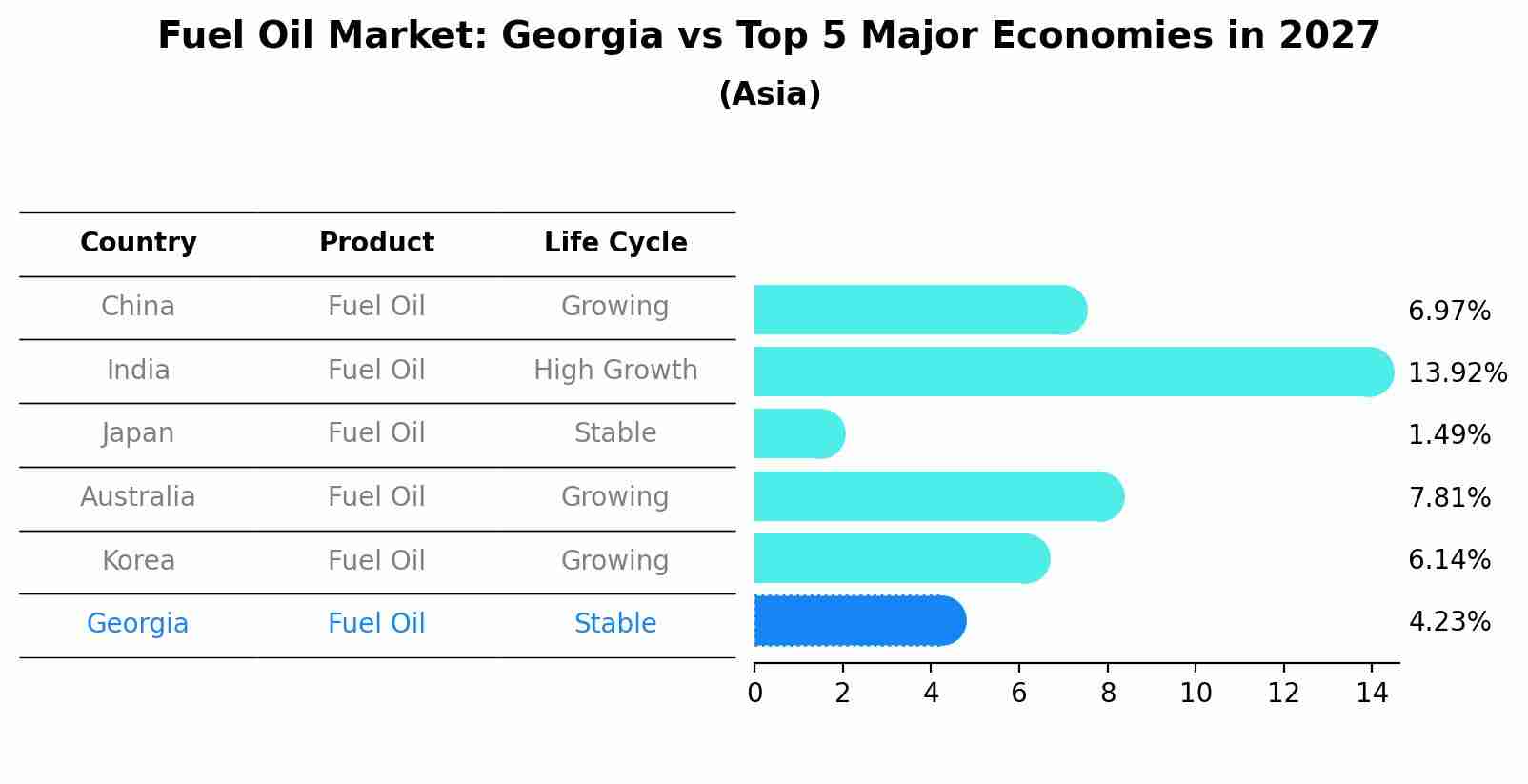Georgia Fuel Oil Market Outlook | Forecast, Industry, COVID-19 IMPACT, Value, Growth, Analysis, Share, Size, Companies, Trends & Revenue
| Product Code: ETC234600 | Publication Date: Aug 2022 | Updated Date: Aug 2025 | Product Type: Market Research Report | |
| Publisher: 6Wresearch | Author: Ravi Bhandari | No. of Pages: 75 | No. of Figures: 35 | No. of Tables: 20 |
Georgia Fuel Oil Market Size Growth Rate
The Georgia Fuel Oil Market may undergo a gradual slowdown in growth rates between 2025 and 2029. Although the growth rate starts strong at 4.54% in 2025, it steadily loses momentum, ending at 3.31% by 2029.

Fuel Oil Market: Georgia vs Top 5 Major Economies in 2027 (Asia)
The Fuel Oil market in Georgia is projected to grow at a stable growth rate of 4.23% by 2027, within the Asia region led by China, along with other countries like India, Japan, Australia and South Korea, collectively shaping a dynamic and evolving market environment driven by innovation and increasing adoption of emerging technologies.

Georgia Fuel Oil Market Overview
Fuel oil remains a significant energy source in Georgia, particularly in sectors such as shipping, power generation, and industrial heating. The fuel oil market in Georgia is influenced by factors such as global energy prices, regulatory policies, and technological advancements in alternative fuels. While there is growing interest in renewable energy sources and cleaner alternatives to traditional fossil fuels, fuel oil continues to play a vital role in meeting the energy needs of various industries in Georgia. Suppliers and distributors in Georgia are adapting to market dynamics by offering a diverse range of fuel oil products and exploring opportunities for energy efficiency and emissions reduction.
Drivers of the market
The fuel oil market in Georgia is influenced by factors such as energy demand, global oil prices, regulatory policies, and technological advancements. Fuel oil is primarily used for heating, power generation, and industrial processes in residential, commercial, and industrial sectors. With growing concerns regarding air quality, greenhouse gas emissions, and energy efficiency, there is a shift towards cleaner and more sustainable fuel alternatives such as natural gas, electricity, and renewable energy sources. However, fuel oil continues to play a significant role in certain applications where alternatives may be less feasible or cost-effective. Additionally, geopolitical factors and market dynamics influence the supply, demand, and pricing of fuel oil in the region.
Challenges of the market
In the Georgia fuel oil market, challenges arise from shifting energy policies, environmental regulations, and market volatility. As the focus shifts towards cleaner and renewable energy sources, traditional fuel oil suppliers face pressure to adapt their offerings and business models. Moreover, fluctuations in crude oil prices and geopolitical uncertainties can impact fuel oil pricing and supply chain dynamics, posing challenges for market stability.
Government Policy of the market
In Georgia, the fuel oil market is subject to regulations aimed at ensuring the quality, safety, and reliability of fuel oil products used for heating, power generation, and industrial processes. The government sets specifications and standards for the composition, viscosity, and sulfur content of fuel oils to protect public health and the environment. Regulatory agencies conduct inspections and testing of fuel oil facilities to verify compliance with established requirements and to prevent adulteration or contamination. Additionally, efforts are made to promote the use of cleaner and renewable fuel oil alternatives to reduce emissions and dependence on fossil fuels.
Key Highlights of the Report:
- Georgia Fuel Oil Market Outlook
- Market Size of Georgia Fuel Oil Market, 2021
- Forecast of Georgia Fuel Oil Market, 2028
- Historical Data and Forecast of Georgia Fuel Oil Revenues & Volume for the Period 2018 - 2028
- Georgia Fuel Oil Market Trend Evolution
- Georgia Fuel Oil Market Drivers and Challenges
- Georgia Fuel Oil Price Trends
- Georgia Fuel Oil Porter's Five Forces
- Georgia Fuel Oil Industry Life Cycle
- Historical Data and Forecast of Georgia Fuel Oil Market Revenues & Volume By Application for the Period 2018 - 2028
- Historical Data and Forecast of Georgia Fuel Oil Market Revenues & Volume By Marine for the Period 2018 - 2028
- Historical Data and Forecast of Georgia Fuel Oil Market Revenues & Volume By Industrial for the Period 2018 - 2028
- Historical Data and Forecast of Georgia Fuel Oil Market Revenues & Volume By Others for the Period 2018 - 2028
- Georgia Fuel Oil Import Export Trade Statistics
- Market Opportunity Assessment By Application
- Georgia Fuel Oil Top Companies Market Share
- Georgia Fuel Oil Competitive Benchmarking By Technical and Operational Parameters
- Georgia Fuel Oil Company Profiles
- Georgia Fuel Oil Key Strategic Recommendations
Frequently Asked Questions About the Market Study (FAQs):
1 Executive Summary |
2 Introduction |
2.1 Key Highlights of the Report |
2.2 Report Description |
2.3 Market Scope & Segmentation |
2.4 Research Methodology |
2.5 Assumptions |
3 Georgia Fuel Oil Market Overview |
3.1 Georgia Country Macro Economic Indicators |
3.2 Georgia Fuel Oil Market Revenues & Volume, 2021 & 2028F |
3.3 Georgia Fuel Oil Market - Industry Life Cycle |
3.4 Georgia Fuel Oil Market - Porter's Five Forces |
3.5 Georgia Fuel Oil Market Revenues & Volume Share, By Application, 2021 & 2028F |
4 Georgia Fuel Oil Market Dynamics |
4.1 Impact Analysis |
4.2 Market Drivers |
4.2.1 Increasing demand for fuel oil in various industries in Georgia |
4.2.2 Growth in oil and gas exploration activities in the region |
4.2.3 Government initiatives promoting the use of fuel oil for energy generation |
4.3 Market Restraints |
4.3.1 Volatility in global oil prices affecting the cost of fuel oil |
4.3.2 Stringent environmental regulations impacting the use of fuel oil |
4.3.3 Competition from alternative energy sources such as natural gas and renewable energy |
5 Georgia Fuel Oil Market Trends |
6 Georgia Fuel Oil Market, By Types |
6.1 Georgia Fuel Oil Market, By Application |
6.1.1 Overview and Analysis |
6.1.2 Georgia Fuel Oil Market Revenues & Volume, By Application, 2018 - 2028F |
6.1.3 Georgia Fuel Oil Market Revenues & Volume, By Marine, 2018 - 2028F |
6.1.4 Georgia Fuel Oil Market Revenues & Volume, By Industrial, 2018 - 2028F |
6.1.5 Georgia Fuel Oil Market Revenues & Volume, By Others, 2018 - 2028F |
7 Georgia Fuel Oil Market Import-Export Trade Statistics |
7.1 Georgia Fuel Oil Market Export to Major Countries |
7.2 Georgia Fuel Oil Market Imports from Major Countries |
8 Georgia Fuel Oil Market Key Performance Indicators |
8.1 Average price of fuel oil in Georgia |
8.2 Number of new industrial projects using fuel oil |
8.3 Percentage of energy generated from fuel oil compared to other sources in Georgia |
9 Georgia Fuel Oil Market - Opportunity Assessment |
9.1 Georgia Fuel Oil Market Opportunity Assessment, By Application, 2021 & 2028F |
10 Georgia Fuel Oil Market - Competitive Landscape |
10.1 Georgia Fuel Oil Market Revenue Share, By Companies, 2021 |
10.2 Georgia Fuel Oil Market Competitive Benchmarking, By Operating and Technical Parameters |
11 Company Profiles |
12 Recommendations |
13 Disclaimer |
- Single User License$ 1,995
- Department License$ 2,400
- Site License$ 3,120
- Global License$ 3,795
Search
Thought Leadership and Analyst Meet
Our Clients
Related Reports
- Afghanistan Apparel Market (2026-2032) | Growth, Outlook, Industry, Segmentation, Forecast, Size, Companies, Trends, Value, Share, Analysis & Revenue
- Canada Oil and Gas Market (2026-2032) | Share, Segmentation, Value, Industry, Trends, Forecast, Analysis, Size & Revenue, Growth, Competitive Landscape, Outlook, Companies
- Germany Breakfast Food Market (2026-2032) | Industry, Share, Growth, Size, Companies, Value, Analysis, Revenue, Trends, Forecast & Outlook
- Australia Briquette Market (2025-2031) | Growth, Size, Revenue, Forecast, Analysis, Trends, Value, Share, Industry & Companies
- Vietnam System Integrator Market (2025-2031) | Size, Companies, Analysis, Industry, Value, Forecast, Growth, Trends, Revenue & Share
- ASEAN and Thailand Brain Health Supplements Market (2025-2031) | Strategy, Consumer Insights, Analysis, Investment Trends, Opportunities, Growth, Size, Share, Industry, Revenue, Segments, Value, Segmentation, Supply, Forecast, Restraints, Outlook, Competition, Drivers, Trends, Demand, Pricing Analysis, Competitive, Strategic Insights, Companies, Challenges
- ASEAN Bearings Market (2025-2031) | Strategy, Consumer Insights, Analysis, Investment Trends, Opportunities, Growth, Size, Share, Industry, Revenue, Segments, Value, Segmentation, Supply, Forecast, Restraints, Outlook, Competition, Drivers, Trends, Demand, Pricing Analysis, Competitive, Strategic Insights, Companies, Challenges
- Europe Flooring Market (2025-2031) | Outlook, Share, Industry, Trends, Forecast, Companies, Revenue, Size, Analysis, Growth & Value
- Saudi Arabia Manlift Market (2025-2031) | Outlook, Size, Growth, Trends, Companies, Industry, Revenue, Value, Share, Forecast & Analysis
- Uganda Excavator, Crane, and Wheel Loaders Market (2025-2031) | Strategy, Consumer Insights, Analysis, Investment Trends, Opportunities, Growth, Size, Share, Industry, Revenue, Segments, Value, Segmentation, Supply, Forecast, Restraints, Outlook, Competition, Drivers, Trends, Demand, Pricing Analysis, Competitive, Strategic Insights, Companies, Challenges
Industry Events and Analyst Meet
Whitepaper
- Middle East & Africa Commercial Security Market Click here to view more.
- Middle East & Africa Fire Safety Systems & Equipment Market Click here to view more.
- GCC Drone Market Click here to view more.
- Middle East Lighting Fixture Market Click here to view more.
- GCC Physical & Perimeter Security Market Click here to view more.
6WResearch In News
- Doha a strategic location for EV manufacturing hub: IPA Qatar
- Demand for luxury TVs surging in the GCC, says Samsung
- Empowering Growth: The Thriving Journey of Bangladesh’s Cable Industry
- Demand for luxury TVs surging in the GCC, says Samsung
- Video call with a traditional healer? Once unthinkable, it’s now common in South Africa
- Intelligent Buildings To Smooth GCC’s Path To Net Zero


















